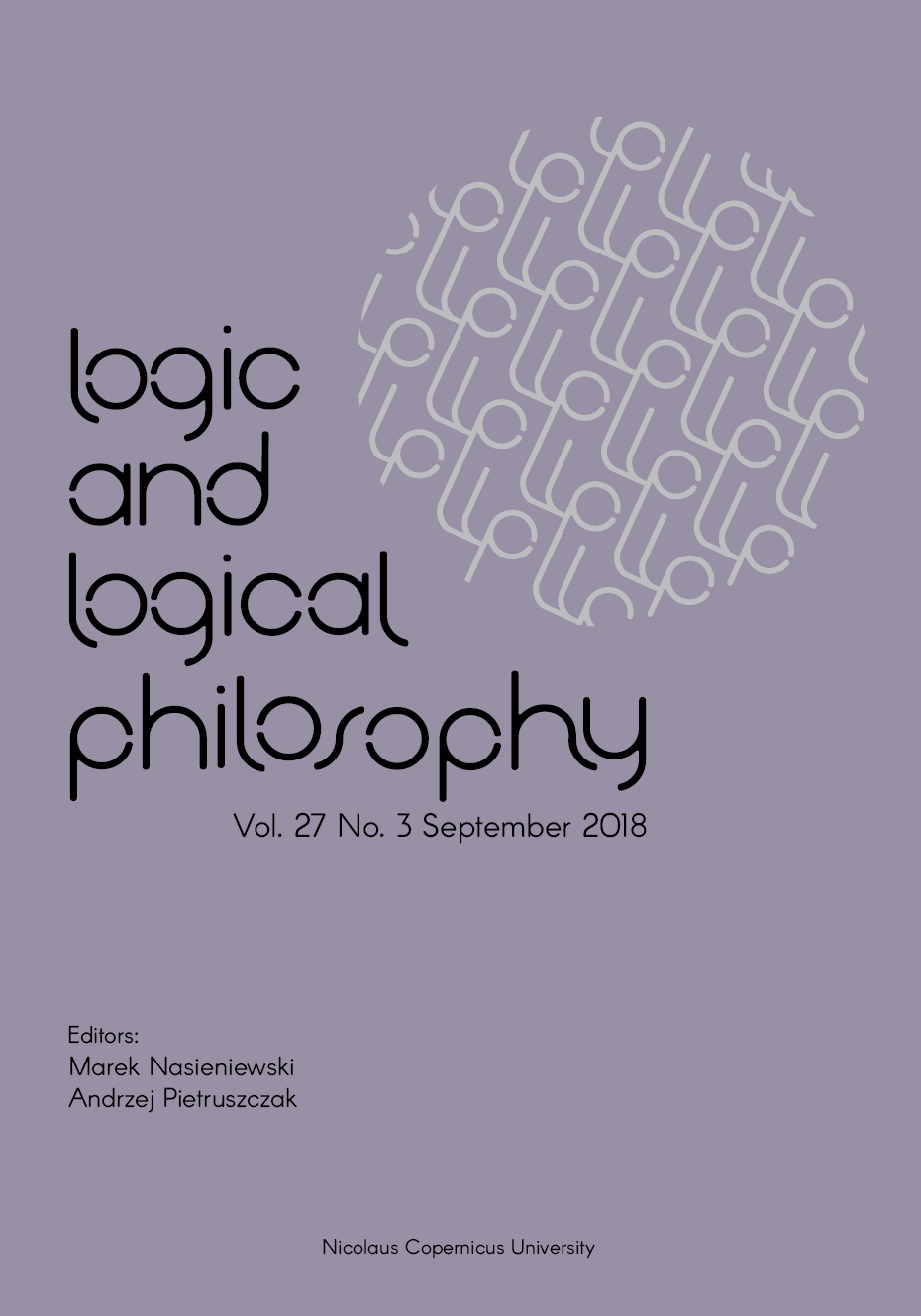Existential Import and Relations of Categorical and Modal Categorical Statements
DOI:
https://doi.org/10.12775/LLP.2017.026Słowa kluczowe
existential import, categorical statements, Square of Opposition, properties, quantified modal logic, partiality, type theoryAbstrakt
I examine the familiar quadruple of categorical statements “Every F is/is not G.”, “Some F is/is not G.” as well as the quadruple of their modal versions “Necessarily, every F is/is not G.”, “Possibly, some F is/is not G.”. I focus on their existential import and its impact on the resulting Squares of Opposition. Though my construal of existential import follows modern approach, I add some extra details which are enabled by framing my definition of existential import within expressively rich higher-order partial type logic. As regards the modal categorical statements, I find that so-called void properties bring existential import to them, so they are the only properties which invalidate subalternation, and thus also contrariety and subcontrariety, in the corresponding Square of Opposition.Bibliografia
Aristotle, De Interpretatione, J.L. Ackrill (ed.), Clarendon Press, 1963.
Béziau, J.-Y., “The new rising of the square of opposition”, pages 3–19 in J.-Y. Béziau and D. Jacquette (eds.), Around and Beyond the Square of Opposition, Birkhäuser, 2012. DOI: 10.1007/978-3-0348-0379-3_1
Béziau, J.-Y., and G. Basti, “The square of opposition: A cornerstone of thought”, pages 3–12 in J.-Y. Béziau and G. Basti (eds.), The Square of Opposition: A Cornerstone of Thought, Studies in Universal Logic, Birkhäuser, 2017. DOI: 10.1007/978-3-319-45062-9_1
Chatti, S., and F. Schang, “The cube, the square and the problem of existential import”, History and Philosophy of Logic 34, 2 (2013): 101–132. DOI: 10.1080/01445340.2013.764962
Church, A., “A formulation of the simple theory of types”, The Journal of Symbolic Logic, 5(2):56–68, 1940. DOI: 10.2307/2266170
Cmorej, P., “Empirické esenciálne vlastnosti” (Empirical essential properties), Organon F 3, 3 (1996): 239–261.
Corcoran, J., and H. Masoud, “Existential import today: New metatheorems; historical, philosophical, and pedagogical misconceptions”, History and Philosophy of Logic 36, 1 (2015): 39–61. DOI: 10.1080/01445340.2014.952947
Correia, M., “The proto-exposition of aristotelian categorical logic”, pages 21–34 in J.-Y. Béziau and G. Basti (eds.), The Square of Opposition: A Cornerstone of Thought, Studies in Universal Logic, Birkhäuser, 2017. DOI: 10.1007/978-3-319-45062-9_3
Cresswell, M.J., “Hyperintensional logic”, Studia Logica 34, 1 (1975): 26–38. DOI: 10.1007/BF02314421
Duží, M., “Presuppositions and two kinds of negation”, Logique et Analyse 239 (2007): 245–263.
Duží, M., B. Jespersen, and P. Materna, Procedural Semantics for Hyperintensional Logic: Foundations and Applications of Transparent Intensional Logic, Springer, 2010. DOI: 10.1007/978-90-481-8812-3
Feferman, S., “Definedness”, Erkenntnis 43, 3 (1995): 295–320. DOI: 10.1007/BF01135376
Fitting, M., and R.L. Mendelsohn, First-Order Modal Logic, Kluwer, 1998. DOI: 10.1007/978-94-011-5292-1
Francez, N., Proof-Theoretic Semantics, College Publications, 2015.
Gamut, L., Logic, Language, and Meaning, Volume 2, “Intensional logic and logical grammar”, The University of Chicago Press, 1991.
Geach, P.T., “Subject and predicate”, Mind 59 (1950): 461–482.
Jespersen, B., “Predication and extensionalization”, Journal of Philosophical Logic 37, 5 (2008): 479–499. DOI: 10.1007/s10992-007-9079-6
Loux, M., Metaphysics: A Contemporary Introduction, Routledge, third edition, 2006. DOI: 10.4324/9780203438244
Luo, Z., “Formal semantics in modern type theories: Is it model-theoretic, proof-theoretic, or both?”, pages 177–188 in N. Asher and S. Soloviev (eds.), Logical Aspects of Computational Linguistics LACL 2014, Lecture Notes in Computer Science, vol. 8535, Springer, 2014. DOI: 10.1007/978-3-662-43742-1_14
Montague, R., Formal Philosophy. Selected Papers of Richard Montague edited by R. Thomason, Yale University Press, 1974.
Moschovakis, Y.N., “A logical calculus of meaning and synonymy”, Linguistics and Philosophy 29, 1 (2005): 27–89. DOI: 10.1007/s10988-005-6920-7
Muskens, R., Meaning and Partiality, CSLI, 1995.
Muskens, R., “Sense and the computation of reference”, Linguistics and Philosophy 28, 4 (2005): 473–504. DOI: 10.1007/s10988-004-7684-1
Muskens, R., “Higher order modal logic”, pages 621–653 in P. Blackburn, J.F. van Benthem, and F. Wolte (eds.), The Handbook of Modal Logic, Elsevier, 2007. DOI: 10.1016/S1570-2464(07)80013-9
Peters, S., and D. Westerståhl, Quantifiers in Language and Logic, Clarendon Press, 2006. DOI: 10.1093/acprof:oso/9780199291267.001.0001
Pezlar, I., “Towards a more general concept of inference”, Logica Universalis 8, 1 (2016): 61–81. DOI: 10.1007/s11787-014-0095-3
Pezlar, I., “Algorithmic theories of problems. a constructive and a non-constructive approach”, Logic and Logical Philosophy, online first article, 2017. DOI: 10.12775/LLP.2017.010
Plantinga, A., “World and essence”, Philosophical Review 79, 4 (1970): 461–492. DOI: 10.2307/2184289
Raclavský, J., “Defining basic kinds of properties”, pages 69–107 in T. Marvan and M. Zouhar (eds.), The World of Language and the World beyond Language, Filozofický ústav SAV, 2007.
Raclavský, J., “On partiality and Tichý’s transparent intensional logic”, Hungarian Philosophical Review 54, 4 (2010): 120–128.
Raclavský, J., “Explicating truth in transparent intensional logic”, pages 167–177 in R. Ciuni, H. Wansing, and C. Willkommen (eds.), Recent Trends in Philosophical Logic, Springer-Verlag, 2014. DOI: 10.1007/978-3-319-06080-4_12
Raclavský, J., “Tichý’s possible worlds”, Organon F 21, 4 (2014): 471–491.
Raclavský, J., “Two standard and two modal squares of opposition”, pages 119–142 in J.-Y. Béziau and G. Basti (eds.), The Square of Opposition: A Cornerstone of Thought, Studies in Universal Logic, Birkhäuser, 2017. DOI: 10.1007/978-3-319-45062-9_8
Raclavský, J., P. Kuchyňka, and I. Pezlar, Transparent Intensional Logic as Characteristica Universalis and Calculus Ratiocinator (in Czech), Masarykova univerzita (Munipress), 1990.
Read, S., “Aristotle and Łukasiewicz on existential import”, Journal of the Philosophy Association 1, 3 (2015): 535–544. DOI: 10.1017/apa.2015.8
Schroeder-Heister, P., “Rules of definitional reflection”, pages 222–232 in Proceedings of the 8th Annual IEEE Symposium on Logic in Computer Science, IEEE Press, 1993. DOI: 10.1109/LICS.1993.287585
Strawson, P.F., “On referring”, Mind 59, 235 (1950): 320–344.
Tichý, P., “Existence and god”, The Journal of Philosophy 76, 8 (1979): 403–420. DOI: 10.2307/2025409
Tichý, P., “Foundations of partial type theory”, Reports on Mathematical Logic 14 (1982): 57–72.
Tichý, P., “Constructions”, Philosophy of Science 53, 4 (1986): 514–534. DOI: 10.1086/289338
Tichý, P., The Foundations of Frege’s Logic, Walter de Gruyter, 1988. DOI: 10.1515/9783110849264
Tichý, P., Pavel Tichý’s Collected Papers in Logic and Philosophy, V. Svoboda, B. Jespersen, and C. Cheyne (eds.), The University of Otago Press, Filosofia, 2004.
von Fintel, K., “Would you believe it? The king of France is back! (Presuppositions and truth-value intuitions)”, pages 315–341 in M. Reimer and A. Bezuidenhout (eds.), Descriptions and Beyond, Oxford University Press, 2006.
Pobrania
Opublikowane
Jak cytować
Numer
Dział
Statystyki
Liczba wyświetleń i pobrań: 1268
Liczba cytowań: 1







